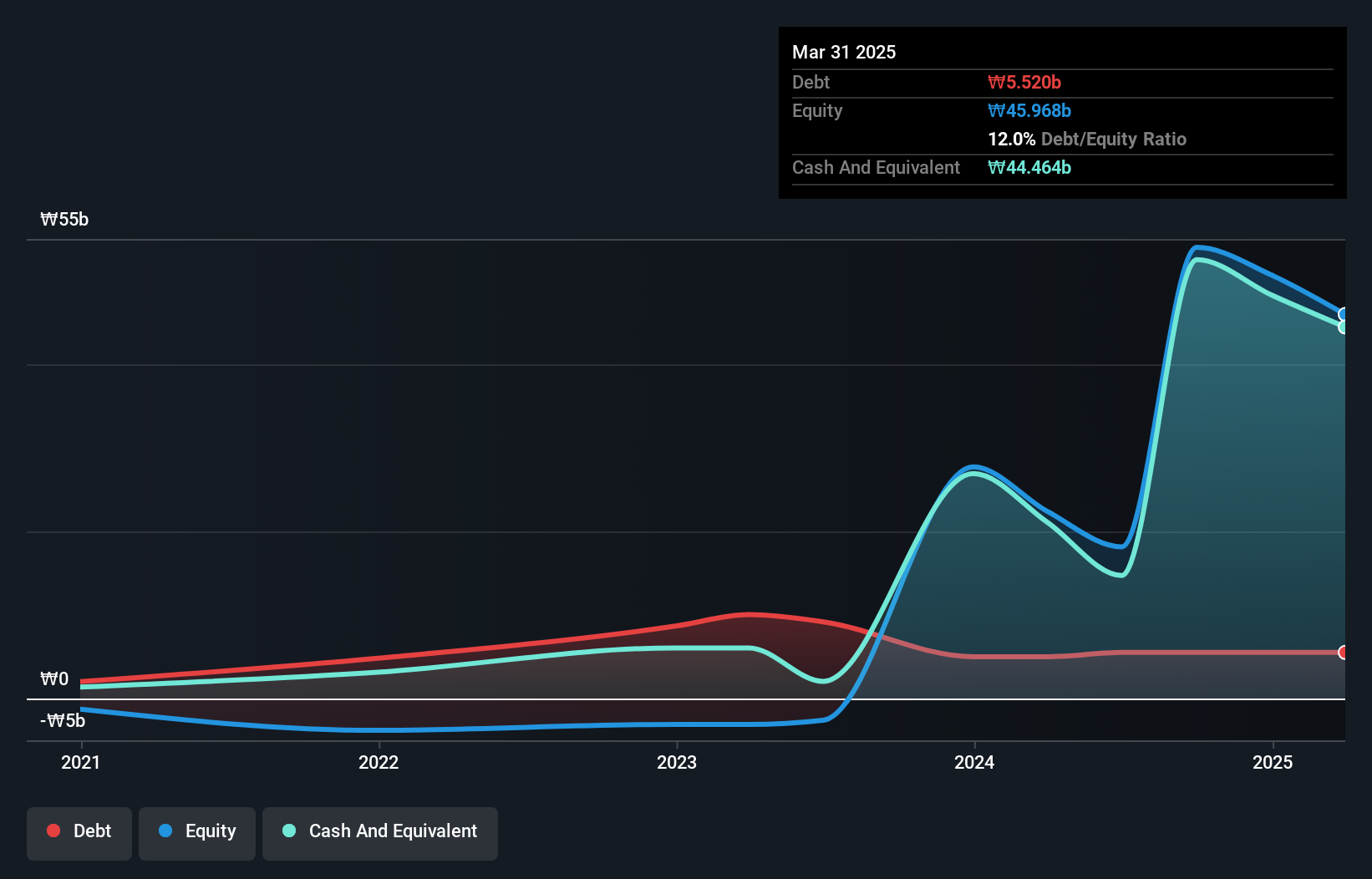- South Korea
- /
- Semiconductors
- /
- KOSDAQ:A432720
Qualitas Semiconductor (KOSDAQ:432720) Has Debt But No Earnings; Should You Worry?
Warren Buffett famously said, 'Volatility is far from synonymous with risk.' It's only natural to consider a company's balance sheet when you examine how risky it is, since debt is often involved when a business collapses. As with many other companies Qualitas Semiconductor (KOSDAQ:432720) makes use of debt. But should shareholders be worried about its use of debt?
Why Does Debt Bring Risk?
Debt is a tool to help businesses grow, but if a business is incapable of paying off its lenders, then it exists at their mercy. Ultimately, if the company can't fulfill its legal obligations to repay debt, shareholders could walk away with nothing. However, a more common (but still painful) scenario is that it has to raise new equity capital at a low price, thus permanently diluting shareholders. Of course, debt can be an important tool in businesses, particularly capital heavy businesses. The first step when considering a company's debt levels is to consider its cash and debt together.
What Is Qualitas Semiconductor's Net Debt?
The image below, which you can click on for greater detail, shows that at March 2025 Qualitas Semiconductor had debt of ₩5.52b, up from ₩5.00b in one year. But on the other hand it also has ₩44.5b in cash, leading to a ₩38.9b net cash position.

A Look At Qualitas Semiconductor's Liabilities
Zooming in on the latest balance sheet data, we can see that Qualitas Semiconductor had liabilities of ₩10.8b due within 12 months and liabilities of ₩1.67b due beyond that. Offsetting this, it had ₩44.5b in cash and ₩315.4m in receivables that were due within 12 months. So it can boast ₩32.3b more liquid assets than total liabilities.
This excess liquidity suggests that Qualitas Semiconductor is taking a careful approach to debt. Due to its strong net asset position, it is not likely to face issues with its lenders. Succinctly put, Qualitas Semiconductor boasts net cash, so it's fair to say it does not have a heavy debt load! When analysing debt levels, the balance sheet is the obvious place to start. But you can't view debt in total isolation; since Qualitas Semiconductor will need earnings to service that debt. So if you're keen to discover more about its earnings, it might be worth checking out this graph of its long term earnings trend.
See our latest analysis for Qualitas Semiconductor
Over 12 months, Qualitas Semiconductor made a loss at the EBIT level, and saw its revenue drop to ₩7.2b, which is a fall of 19%. We would much prefer see growth.
So How Risky Is Qualitas Semiconductor?
By their very nature companies that are losing money are more risky than those with a long history of profitability. And we do note that Qualitas Semiconductor had an earnings before interest and tax (EBIT) loss, over the last year. Indeed, in that time it burnt through ₩18b of cash and made a loss of ₩18b. However, it has net cash of ₩38.9b, so it has a bit of time before it will need more capital. Overall, its balance sheet doesn't seem overly risky, at the moment, but we're always cautious until we see the positive free cash flow. The balance sheet is clearly the area to focus on when you are analysing debt. But ultimately, every company can contain risks that exist outside of the balance sheet. For instance, we've identified 2 warning signs for Qualitas Semiconductor (1 is a bit unpleasant) you should be aware of.
If, after all that, you're more interested in a fast growing company with a rock-solid balance sheet, then check out our list of net cash growth stocks without delay.
Valuation is complex, but we're here to simplify it.
Discover if Qualitas Semiconductor might be undervalued or overvalued with our detailed analysis, featuring fair value estimates, potential risks, dividends, insider trades, and its financial condition.
Access Free AnalysisHave feedback on this article? Concerned about the content? Get in touch with us directly. Alternatively, email editorial-team (at) simplywallst.com.
This article by Simply Wall St is general in nature. We provide commentary based on historical data and analyst forecasts only using an unbiased methodology and our articles are not intended to be financial advice. It does not constitute a recommendation to buy or sell any stock, and does not take account of your objectives, or your financial situation. We aim to bring you long-term focused analysis driven by fundamental data. Note that our analysis may not factor in the latest price-sensitive company announcements or qualitative material. Simply Wall St has no position in any stocks mentioned.
About KOSDAQ:A432720
Excellent balance sheet with very low risk.
Market Insights
Community Narratives


Recently Updated Narratives


MINISO's fair value is projected at 26.69 with an anticipated PE ratio shift of 20x


The Quiet Giant That Became AI’s Power Grid


Nova Ljubljanska Banka d.d will expect a 11.2% revenue boost driving future growth
Popular Narratives


The company that turned a verb into a global necessity and basically runs the modern internet, digital ads, smartphones, maps, and AI.


MicroVision will explode future revenue by 380.37% with a vision towards success



